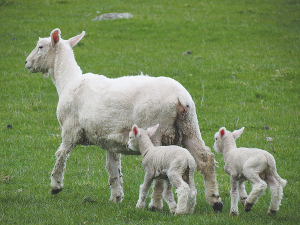Cows down
OPINION: It's not happening as fast as the greenies would like - they actually want all livestock other than Muscovy ducks and Tibetan Llamas to disappear entirely - but it is happening.
 The breeding ewe flock continues to decline with a 0.9% reduction following a 5.2% reduction in 2022.
The breeding ewe flock continues to decline with a 0.9% reduction following a 5.2% reduction in 2022.
A new study from Beef + Lamb NZ (B+LNZ) shows that land-use change is continuing to have an impact on livestock numbers.
The B+LNZ Stock Number Survey, which provides an assessment of New Zealand’s sheep flock and beef cattle herd, shows the breeding ewe flock continues to decline with a 0.9% reduction following a 5.2% reduction in 2022.
B+LNZ chief insight officer Julian Ashby says the breeding flock is the key indicator of future flock size.
“It’s trending down and is expected to continue to decline, one of the contributing factors is land-use change,” says Ashby.
“The amount of sheep and beef farmland being converted to forestry, along with the cumulative impact of a range of other policies on farm viability, is concerning.”
An updated analysis of land-use change from pastoral farming to large-scale forestry released by B+LNZ in July shows more than 200,000ha of sheep and beef farms had been sold into forestry in the last five years.
Ashby says this is now being reflected in livestock numbers.
“We have been saying for some time that there needs to be specific limits on the amount of forestry that can be used to offset fossil fuel emissions in the ETS,” he says.
“B+LNZ is not anti-forestry, we know many farmers are interested in integrating trees into their farms, but there must be some balance.”
On a more positive note, the forecast for lambing is expected to slightly increase this spring.
B+LNZ Economic Service chief economist Andrew Burtt says this is good news for both farmers and exporters and follows favourable Autumn conditions for ewes at mating.
Meanwhile, the total number of beef cattle at 30 June 2023, estimated at 3.81 million, is down 2.4%.
“The number of breeding cows and heifers increased 1.1 percent, with the South Island, mostly, leading the increase. Breeding cow numbers lifted as farmers chose to reduce weaner and trading cattle numbers,” says Burtt.
“The number of beef cattle weaners decreased 3.2 percent overall, but Southland farms bucked the trend and replenished weaner numbers by over 20 percent following two years of dry conditions.”
Thus far in 2025, the Hawke's Bay rescue helicopter crew have completed over 220 missions, resulting in numerous positive patient outcomes.
The New Zealand Food Network's (NZFN) fifth birthday celebrations have been boosted by a whopping five tonne meat donation from meat processor ANZCO.
Pukekohe vegetable growers farewelled 101-year-old Alan Wilcox in late July, celebrating his many achievements and reflecting the widespread respect in which he was held.
A new nationwide survey shows New Zealanders expect farmers and food producers to play a leading role in cutting greenhouse gas emissions, but also gave them higher marks than most industries for their current efforts.
North Otago farmer Jane Smith is standing for the Ravensdown South Island director seat.
The Government and horticulture sector have unveiled a new roadmap with an aim to double horticulture farmgate returns by 2035.